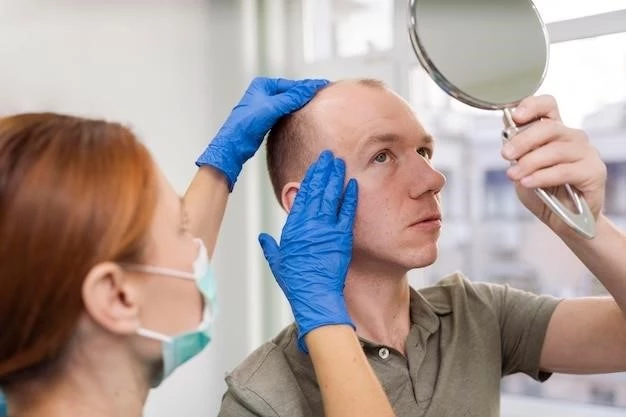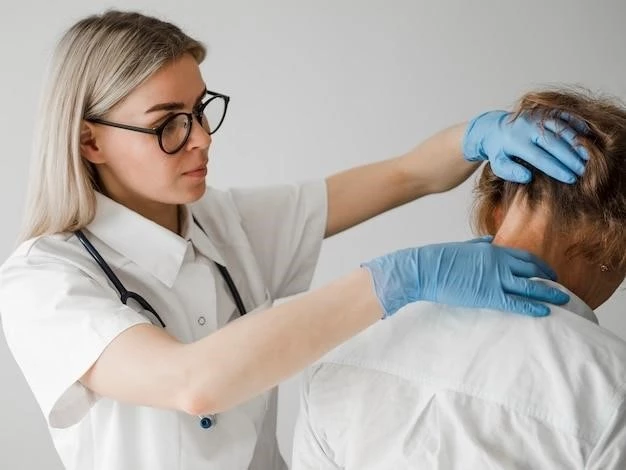Introduction to Trichofolliculoma
Trichofolliculoma is a rare benign tumor of the skin‚ characterized by a central dilated pore with tufted hairs‚ mostly affecting the face and scalp. Learn more about this condition here.
Trichofolliculoma is a benign hair follicle tumor that typically presents as a small papule or nodule on the face or scalp‚ characterized by tufted hairs emerging from a central pore. It is often confused with other skin conditions like basal cell carcinoma or sebaceous cysts. This condition is more common in younger individuals and has a good prognosis when properly diagnosed and managed.
Definition and Characteristics
Trichofolliculoma is a benign hair follicle tumor typically found on the face or scalp. It presents as a small nodule with tufted hairs emerging from a central pore. This condition is often mistaken for other skin issues. It commonly affects younger individuals and has a good prognosis when managed appropriately.
Trichofolliculoma typically appears as a small‚ solitary nodule commonly found on the face‚ particularly around the nose region. It is characterized by a central pore with hairs emerging from it‚ surrounded by a dense stroma. The histology of trichofolliculoma shows multiple small follicles radiating from a central larger follicle. While it is benign‚ it can be mistaken for other skin conditions like basal cell carcinoma or sebaceous cysts.
Location and Appearance
Trichofolliculoma typically appears as a small‚ solitary nodule most commonly found on the face‚ particularly around the nose region. It is characterized by a central pore with hairs emerging from it‚ surrounded by a dense stroma. Its appearance can mimic other skin conditions‚ emphasizing the importance of accurate diagnosis through histological evaluation. Early detection and differentiation are key in managing this condition effectively.
Diagnostic Methods and Considerations
Diagnosing trichofolliculoma often requires a histological examination to distinguish it from other skin conditions like basal cell carcinoma or sebaceous cysts. Dermoscopy can be helpful in assessing the central pore and surrounding features. Pathologists may observe multiple small follicles radiating from a central larger follicle‚ aiding in accurate identification. Considering the clinical presentation and histological findings is crucial for an effective diagnosis and appropriate management plan.

Clinical Presentation of Trichofolliculoma
Trichofolliculoma commonly manifests as a small nodule on the face or scalp with tufted hairs emanating from a central pore. This distinctive appearance aids in distinguishing it from other skin conditions.
Management Strategies and Approaches
When managing trichofolliculoma‚ accurate diagnosis through histological evaluation is crucial to differentiate it from other skin conditions. Treatment options may include surgical excision‚ laser therapy‚ or cryotherapy depending on the size and location of the lesion. Regular follow-up appointments are essential to monitor for any signs of recurrence or complications post-treatment. Consulting with a dermatologist for personalized care and treatment recommendations is recommended for optimal outcomes.
Microscopic Examination and Findings
Under the microscope‚ trichofolliculoma exhibits numerous small follicles radiating from a larger central follicle‚ all embedded within a distinct stroma. This histological pattern aids in confirming the diagnosis of this benign hair follicle tumor.
Treatment Options for Trichofolliculoma
Trichofolliculoma can be managed through various treatment approaches‚ including surgical excision‚ laser therapy‚ or cryotherapy‚ depending on the size and location of the lesion. Regular monitoring post-treatment is essential to detect any recurrence or complications. Seeking guidance from a dermatologist for personalized care is crucial in achieving the best therapeutic outcomes.
Prognosis and Complications Associated with Trichofolliculoma
Trichofolliculoma typically has an excellent prognosis as it is a benign tumor; however‚ it can sometimes be mistaken for malignant conditions. Understanding potential complications and promptly addressing them through proper diagnosis and management are crucial for optimal outcomes.
Outcomes and Potential Risks
The prognosis for trichofolliculoma is generally favorable due to its benign nature‚ but there may be risks of misdiagnosis and confusion with other skin conditions like basal cell carcinoma. Prompt and accurate diagnosis is vital to avoid unnecessary anxiety and ensure appropriate management for optimal outcomes.
Research and Recent Advances in Trichofolliculoma
Recent studies have advanced the understanding of trichofolliculoma as a rare benign tumor derived from the hair follicle‚ often found on the face and scalp. Stay informed about the latest research developments in this field to ensure accurate diagnosis and effective management strategies.
Studies and Developments
Recent studies have elucidated trichofolliculoma as a rare benign tumor originating from the hair follicle‚ mainly found on the face and scalp. Understanding the distinct histological features and differentiating it from other skin conditions have been key areas of research. Advances in diagnostic techniques and treatment modalities aim to enhance the management of trichofolliculoma for improved patient outcomes.

Prevention and Lifestyle Recommendations for Trichofolliculoma
To help prevent trichofolliculoma‚ it is crucial to maintain good skincare practices‚ including gentle cleansing and avoiding harsh chemicals. Protecting the skin from excessive sun exposure can also be beneficial. Regular check-ups with a dermatologist can aid in early detection and appropriate management if any suspicious skin changes arise.
Preventive Measures and Healthy Practices
Adopting good skincare habits‚ such as gentle cleansing and sun protection‚ can help reduce the risk of trichofolliculoma. Regular skin check-ups with a dermatologist are advised to monitor any changes and address concerns promptly. Avoiding harsh chemicals on the skin and practicing sun-safe behaviors are essential preventive measures to maintain healthy skin.
Support Resources and Organizations for Trichofolliculoma
For support and information on trichofolliculoma‚ consider reaching out to dermatological organizations‚ skin cancer foundations‚ or local support groups specializing in skin conditions. Connecting with these resources can provide valuable guidance and support during your journey with trichofolliculoma.
Helpful Contacts and Communities
For assistance and connection with others affected by trichofolliculoma‚ consider reaching out to dermatology associations‚ online forums‚ or patient support groups specializing in skin conditions. These resources can provide valuable support‚ information‚ and a sense of community during your experience with trichofolliculoma.
